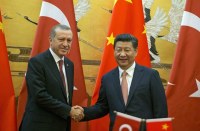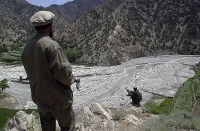Another blood-soaked week for Indian Muslims
The last several days have served as a deeply grim reminder of how Hindutva extremist violence against Muslims is becoming normalised to the point of only being “newsworthy” among those with specific concerns for the humanitarian crisis that is brewing under the deeply controversial BJP government of Narendra Modi.
On the 23rd of March, horrifying video emerged of a Hindutva lynch mob attacking a Muslim family with sticks and swords while the desperate cries of a female relative can be heard in the background. The incident which took place in Haryana state was apparently triggered by something as innocent as a stray cricket ball. This led to a violent break-in of the Muslim family’s private property by the violent and heavily armed mob.
Mob lynching in broad day light.
A Muslim family is brutally attacked by goons in Bhondsi, Gurgaon, Haryana .
Dispute happened because Cricket ball hit someone ..
WARNING : Don't watch if you can't see sensitive videos. pic.twitter.com/ltslxXZmXQ
— Md Asif Khan آصِف (@imMAK02) March 22, 2019
Days before, a 50 year old man in Uttar Pradesh was beaten to death by a Hindutva mob of 20 young thugs, all the while his young son looked on in horror.
And yet these recent incidents are not isolated but are instead part of a wider development whereby radical Hindutva lynch mobs are both actively and subliminally encouraged to commit crimes against humanity by the political class.
Normalising refugees and migrants…unless they are Muslims
Determining the citizenship of peasants in India has always been a difficult task due to the lack of modern local governance in remote and rural regions, as well as due to the fact that many of the people in question simply do not have any modern documentation that is typically used to determine one’s status as a citizen. It is against this background that India’s lower house of Parliament has decided to pass a proposal as part of the Citizenship Amendment Bill, 2019, that would see all un-documented Indian residents have their status normalised as full Indian citizens - with the exception of Muslims.
The passage of the new proposals have led to riots in India’s eastern Assam state where last year, four million Muslims were left off of citizenship rolls, effectively leaving them stateless even though most of these people had spent much or even all of their lives in India. While many believe that the controversial bill won’t be cleared by the upper house of India’s parliament, the fact that such an explicitly discriminatory piece of legislation could even be considered, says a great deal about the anti-Islamic tricks that Premier Narendra Modi’s BJP has up its sleeves in the run-up to this year’s general election.
While India has not even been able to conduct a proper tally of its own residents and has struggled throughout 2018 to attempt and conduct such a thing without resorting to overt discrimination, the wider global media has been focused more on Donald Trump’s border wall than on India’s wholesale discrimination against 172 million of its Muslim citizens, as well as the discrimination against millions of non-documented Muslims who know no other home than India.
Legally, Trump’s border wall does not violate any part of the US constitution and it is of course the right of every nation to physically secure its borders, just as Pakistan and Turkey have done in respect of portions of their borders with hostile neighbours. But what India is doing is something very different. India is punishing millions of people in Assam and beyond, for the fact that they were brought to India as genuine refugees and had lived for years in a system with widespread deficiencies in local governance that did not allow for a traditional normalisation of their status within India.
The BJP’s internal partition
The current citizenship proposals do in fact acknowledge past deficiencies in local and regional governments that have left many millions of people without genuine social security. While New Delhi seeks to rectify this situation in respect of undocumented Hindus, Sikhs, Christians, Jains, Buddhists, Parsis and others so long as they can prove that they have lived normal lives in India for at least six years, Muslims are not covered by the new legislation which acknowledges past injustices against those who arrived in India after leaving Bangladesh, Afghanistan and Pakistan.
In spite of India’s secular constitution which prohibits such targeted state sponsored discrimination, under the BJP government of Modi, such measures are becoming the rule rather than the exception. But it is not just the government of India going out of its way to discriminate against undocumented Muslims that ought to worry genuine supporters of human rights throughout the world. The BJP at both a national and regional level continues to go out of its way to discriminate against and endanger the lives and welfare of millions of Indian Muslims whose families have been full Indian citizens since 1947.
It is as though the BJP seeks a second partition of India, only this time rather than involving the movement of people, this ‘internal partition’ involves the cultural cleansing of India’s Islamic history whilst the wholesale dehumanisation of 127 million people continues in tandem.
A rape plague
In January of 2018, Asifa Bano, an eight year old Muslim girl was kidnapped by a gang of Hindutva extremists where she was gang raped and murdered inside a Hindu temple. This horrific incident became symbolic of a crime wave against minorities in India where women are often the foremost victims of horrific sexual assaults.
In June of 2018, it was reported that five female activists in the Indian state of Jharkhand who were attempting to document and stop human trafficking in the region, were themselves kidnapped and gang rapped at gunpoint.
The seriousness of the rape epidemic in India is compounded by the fact that powerful political figures and so-called “philosophers” have not only justified but endorsed rape as a political and social weapon against minorities, including and especially Muslim women.
According to Pakistani-American journalist Riaz Haq,
“It is hard to say how many of the rape victims were Muslim. What is known, however, is the exhortation by iconic Hindutva leaders to rape of Muslim women. Vinayak Damodar Savarkar, one of founders of right-wing RSS who Prime Minister Modi describes as “worthy of worship”, is among them. After getting elected as to the highest office in India, Modi paid tribute to Savarkar by laying flowers at his portrait that hangs in India’s Parliament.
VD Savarkar, in one of his books titled Six Glorious Epochs of Indian History, elaborates on why raping of Muslim women is not only justified but encouraged.
Savarkar has used revisionist Hindutva history to exhort his followers to rape Muslim women as payback for historic wrongs he believes were committed by Muslim conquerers of India. ‘Once they are haunted with this dreadful apprehension that the Muslim women too, stand in the same predicament in case the Hindus win, the future Muslim conquerors will never dare to think of such molestation of Hindu women’, he writes”.
What one is witnessing in India is more than an average crime epidemic. It is part of a wider systematic breakdown in society that has seen Muslim men lynched for allegedly slaughtering a cow for beef, entire Muslim families murdered for allegedly eating beef, other Muslims lynched for other cow related “offences” Muslim women and children raped because they are considered subhuman by Hindutva extremists and other minority groups as well as so-called Dalits - members of Hinduisms “untouchable” caste treated much the same.
Government supporting Hindutva extremists kill and terrorise Muslims
While India’s secular democracy still exists in theory, in practice extremist Hindu groups that at both regional levels and now at a national level are threatening to erase not only the history of important periods in India’s development that were shaped by Islamic characteristics, but in so doing, the forces of political Hindutva are erasing the cultural and religious identity of millions of modern day Indian citizens.
Today, the greatest victims of acculturation and oppression in modern India are Indian Muslims - particularly those in northern India. Northern India remains the political heartland of the ruling political faction BJP as well as its allied militant group RSS. The year 2002 remains a watershed in the post-colonial history of India as it was then in Gujarat state that a violent pogrom was instigated against Muslims leaving up to 2,000 dead. Most worrying, the Chief Minister of Gujarat in 2002 was a man called Narendra Modi who is now India’s Prime Minister. Many witnesses to the violence in Gujarat continue to assert that Modi’s state government as well as police and other public authorities intentionally allowed the violence to spiral out of control when clearly it is the duty of any government to quash violence and enforce an orderly rule of law.
In the years since the BJP formed the current Indian government, the rise of so called “cow protection mobs“, the phenomenon where gangs of extremist Hindus attack and often lynch Muslims accused of eating or trading in beef products, has also skyrocketed. In many cases, the Muslim victims of murder and vicious assault were simply targeted for being Muslims rather than for having anything to do with butchering cows, selling or eating beef.
Culture cleansing
The contemporary assault on Muslims in India however is not just limited to the mob violence which is clearly sanctioned by elements of the ruling party and their far-right allies. The historic city of Allahabad in the Indian state of Uttar Pradesh has recently been the site of controversy after the BJP’s Uttar Pradesh Chief Minister Yogi Adityanath decided to unilaterally rename the city Prayagraj. This is a clear attempt to erase the history of the Mughal Empire which incidentally was the pre-1947 independent sovereign entity which came closest to uniting all of what was now India in the early modern period.
One of India’s most internationally famous monuments, the Taj Mahal was built on the orders of Mughal Emperor Shah Jahan as an Islamic shrine for his wife. While Indian tourism associations promote the Taj Mahal as one of the country’s top destinations, the Archaeological Survey of India have now taken the decision to prohibit Muslim pilgrims from worshipping in the Taj Mahal’s mosque on every day of the week except Friday.
This attempt to de-Islamify one of the world’s most recognisable Islamic shrines is yet another attempt to erase Muslim history and specifically Mughal history from the collective consciousness of modern India.
But beyond the attempts to culturally cleanse Islam from India, it was recently reported that a Uttar Pradesh Assembly member of the ruling BJP just stated that he is ready to bomb minorities who claim that their safety is no longer guaranteed in India.
Such behaviour however should not be surprising as the ruling party of India is associated with the RSS - a movement that is in effect an officially sanctioned violence squad.
The United Nations must get involved
Taken individually, each of the aforementioned catastrophes would warrant international attention from genuinely concerned human rights organisations. But taken as a whole, one sees the emergence of a total human rights crisis throughout much of India. To be sure, southern India remains calm, but in much of northern India, violence against Muslims by Hindutva extremists is becoming so regularised that the world risks becoming desensitised to the extreme levels and primitive nature of the Hindutva ultra-violence. Furthermore, as the ruling BJP and their political and militant allies are guiding and encouraging much of the violence, this is all the more reason for the UN to take swift action.
The UN’s credibility has been frequently challenged throughout its existence but seeing as the violence against Indian Muslims is a clear-cut issue of human rights violations on a grand scale, the UN has absolutely no excuse not to do all that it can to end the violence.




